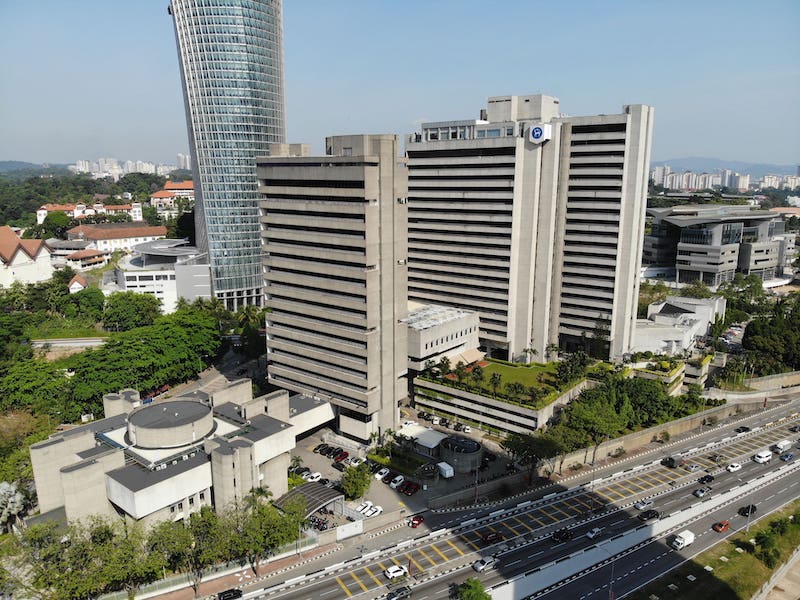about the bank

Bank Negara Malaysia (the Central Bank of Malaysia), is a statutory body which started operations on 26 January 1959. Bank Negara Malaysia is governed by the Central Bank of Malaysia Act 2009. The role of Bank Negara Malaysia is to promote monetary and financial stability. This is aimed at providing a conducive environment for the sustainable growth of the Malaysian economy.
Bank Negara Malaysia¡¯s monetary policy stance is to maintain price stability while remaining supportive of growth. Bank Negara Malaysia is also responsible for financial system stability. This is achieved by developing a sound, resilient, progressive and diversified financial sector which serves to support the sectors of the real economy. It also plays an important function in implementing initiatives to deepen and strengthen the financial markets, including the foreign exchange market.
Bank Negara Malaysia has played a significant developmental role in developing the financial system infrastructure in advancing the financial inclusion agenda. This is to ensure all economic sectors and segments of the society have access to financial services. In addition, Bank Negara Malaysia also oversees the nation¡¯s payment systems infrastructure which emphasize on the efficiency and security of the financial systems.
As the banker and adviser to the Government, Bank Negara Malaysia provides advice on macroeconomic policies and the management of public debt. Bank Negara Malaysia is also the sole authority in issuing the national currency and in managing the country's international reserves.
Among the major roles of the Bank is the prudent conduct of monetary policy, which has seen generally low and stable inflation for decades and thereby, preserving the purchasing power of the ringgit. The Bank is also responsible for bringing about financial system stability and fostering a sound and progressive financial sector. There is now in place a well diversified, comprehensive and resilient financial sector, that is able to meet the increasingly sophisticated needs of consumers and businesses, and which has become a growth driver in the economy.
The Bank also plays a significant developmental role, including development of financial system infrastructure with major emphasis placed on building the nation's efficient and secured payment systems as well as the necessary institutions (including Securities Commission, KLSE, now known as Bursa Malaysia and Credit Guarantee Corporation) which are important towards building a comprehensive, robust and resilient financial system.
The Bank actively promotes financial inclusion, which has led to improved access to financial services for all economic sectors and segments of society, thereby supporting balanced economic growth.
Other important roles of the Bank are being a banker and adviser to the Government, playing an active role in advising on macroeconomic policies and managing the public debt. It is also the sole authority in issuing currency as well as managing the country's international reserves.
The roles of the Bank are supported by 39 departments/units covering the following seven functional areas.
Primarily provides good technical and research support on growth-related issues to enhance formulation of monetary and credit policies in promoting monetary stability and ensuring the availability of adequate credit to finance economic growth.
Manage domestic liquidity and exchange rates to ensure that monetary policy targets are achieved as well as managing external reserves to safeguard its value and optimise its returns. It also has the responsibility of providing advice and assistance to the Government in the area of debt and fund management and contributing to domestic financial market development.
Promote financial sector stability through the progressive development of sustainable, robust and sound financial institutions and financial infrastructure, thus enabling a competitive local financial industry to be resilient against the changing future environment as well as leads initiatives to enhance access to financing. It also formulates and implements policies and strategies towards building and positioning Malaysia as a premier integrated Islamic Financial Centre and enhance the financial capability of consumers.
Develop policies and strategies to promote reliable, secure and efficient clearing, settlement and payment systems in the country.
Develop, enhance and implement an effective surveillance framework to ensure safety and soundness of financial institutions and to enforce sound practices in them.
Spearhead the Bank's strategic management, organisational-performance management and programme management functions to drive its performance-improvement processes and strengthening the capacity building of the Bank. It also leads and drives human resources initiatives and other strategic activities to ensure that the overall Human Capital Management framework is implemented effectively.
The communications function has assumed increasing importance in response to the heightened demands of the various stakeholders, seeking greater transparency and disclosure.
Greater engagement with the public
As part of the Bank's emphasis on efficient work culture, effective and efficient delivery of services to stakeholders, including the public, has always been a top priority for the Bank. To promote the public better understanding of their rights, responsibilities, the opportunities and the associated risks and costs as a result of participation in the financial system, the Bank's efforts has been directed towards the following areas:
The Bank has also established the Agensi Kaunseling Dan Pengurusan Kredit (AKPK), with branches located across Malaysia to help consumers manage their debts and become more self-reliant in their financial affairs and thereby preserve the resiliency of the household sector in the economic growth process. Apart from that, the Bank was also instrumental in the setting up of the Ombudsman for Financial Services (OFS), an independent body providing consumers with objective and timely solutions to disputes, claims and complaints arising from services provided by financial institutions.
With the various initiatives in place, the accessibility of the Bank to the public is equally important. Through interaction with the public, the Bank improves their understanding of financial matters as well as gain valuable insights on real issues facing the consumers in the financial sector which serve as inputs for policy decisions. In creating a one-stop centre for public interface, BNMLINK was formed, where customer management and case management is put under one roof, including complaints management and advisory, which among others, facilitates resolution of the public's and SMEs' complaints against institutions under the purview of the Bank. BNMLINK is also established at BNM regional offices in Johor Bahru, Pulau Pinang, Kuala Terengganu, Kota Kinabalu and Kuching.
As the financial system becomes more developed, the Bank has taken measures to raise the level of financial literacy among consumers. Given today's sophisticated financial markets, products and services, the Bank has initiated its Consumer Education Programme nationwide to reach out to the masses. Including Bank's outreach programme to targeted school children to enhance their financial education; and financial education roadshows to reach out to members of the public, including those in the rural areas.



